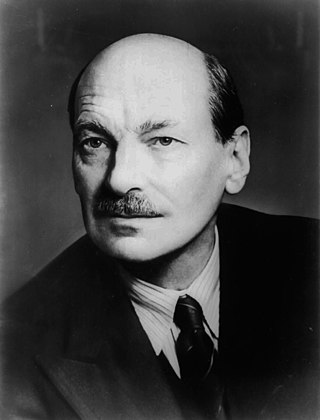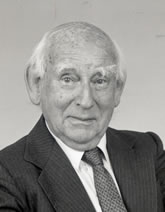Related Research Articles

Alfred Leslie Rowse was a British historian and writer,best known for his work on Elizabethan England and books relating to Cornwall.

The 1945 United Kingdom general election was a national election held on Thursday 5 July 1945,but polling in some constituencies was delayed by some days,and the counting of votes was delayed until 26 July to provide time for overseas votes to be brought to Britain. The governing Conservative Party sought to maintain its position in Parliament but faced challenges from public opinion about the future of the United Kingdom in the post-war period. Prime Minister Winston Churchill proposed to call for a general election in Parliament,which passed with a majority vote less than two months after the conclusion of the Second World War in Europe.

Sir Richard Stafford Cripps was a British Labour Party politician,barrister,and diplomat.

In the politics of the United Kingdom,a National Government is a coalition of some or all of the major political parties. In a historical sense,it refers primarily to the governments of Ramsay MacDonald,Stanley Baldwin and Neville Chamberlain which held office from 1931 until 1940.

Sir Hans Wolfgang Singer was a German-born British development economist best known for the Prebisch-Singer thesis,which states that the terms of trade move against producers of primary products. He is one of the primary figures of heterodox economics.
John Denis Charmley is a British academic and diplomatic historian. Since 2002 he has held various posts at the University of East Anglia:initially as Head of the School of History,then as the Head of the School of Music and most recently as the Head of the Institute for Interdisciplinary Humanities. Since 2016 he has been Pro-Vice Chancellor for Academic strategy at St Mary's University,Twickenham. In this role he has been responsible for initiating the University's Foundation Year Programme,reflecting Professor Charmley's commitment to widening educational access.

Andrew Thorpe is a British historian. He is Professor of Modern History and was Head of History at the University of Exeter. He went on to be Exeter's Director of Research for Humanities and Social Sciences before moving to the University of Leeds in 2019.

The Churchill caretaker ministry was a short-term British government in the latter stages of the Second World War,from 23 May to 26 July 1945. The prime minister was Winston Churchill,leader of the Conservative Party. This government succeeded the national coalition which he had formed after he was first appointed prime minister on 10 May 1940. The coalition had comprised leading members of the Conservative,Labour and Liberal parties and it was terminated soon after the defeat of Nazi Germany because the parties could not agree on whether it should continue until after the defeat of Japan.
Colin Hay is Professor of Political Sciences at Sciences Po,Paris and Affiliate Professor of Political Analysis at the University of Sheffield,joint editor-in-chief of the journal Comparative European Politics. and Managing Editor of the journal New Political Economy.
Joanne Clare Fox,is a British historian specialising in the history of film and propaganda in twentieth-century Europe.

Robert Garner is a British political scientist,political theorist,and intellectual historian. He is a Professor Emeritus in the politics department at the University of Leicester,where he has worked for much of his career. Before working at Leicester,he worked at the University of Exeter and the University of Buckingham,and studied at the University of Manchester and the University of Salford.
Paternalistic conservatism is a strand of conservatism which reflects the belief that societies exist and develop organically and that members within them have obligations towards each other. There is particular emphasis on the paternalistic obligation,referencing the feudal concept of noblesse oblige,of those who are privileged and wealthy to the poorer parts of society. Consistent with principles such as duty,hierarchy,and organicism,it can be seen as an outgrowth of traditionalist conservatism. Paternalistic conservatives do not support the individual or the state in principle but are instead prepared to support either or recommend a balance between the two depending on what is most practical.
Frank Trentmann is a professor of history in the Department of History,Classics and Archaeology at Birkbeck College,University of London. He is a specialist in the history of consumption.
Miles Taylor,FRHistS is a historian of 19th-century Britain,and an academic administrator. Since 2004,he has been a professor of history at the University of York and between 2008 and 2014 he was director of the University of London's Institute of Historical Research.
Stuart Ryan Ball,CBE,FRHistS,is a political historian who retired in 2016 as professor of Modern British History at the University of Leicester,having taught there for 37 years;he is now emeritus professor of Modern History there. He specialises in the history of the Conservative Party.
Martin Francis is a British-American academic historian. He was Henry R. Winkler Professor of Modern History at the University of Cincinnati from 2003 to 2015,when he was appointed Professor of War and History at the University of Sussex.
Adam Marshall Diston was a journalist for the Sunday Dispatch and ghostwriter for Winston Churchill. He had 'close affinities' to Oswald Mosley's British Union of Fascists. He had a military background,serving in a Scottish regiment from 1914 to 1918.

Throughout his life,Winston Churchill made numerous controversial statements on race,which some writers have described as racist. It is furthermore suggested that his personal views influenced important decisions he made throughout his political career,particularly relating to the British Empire,of which he was a staunch advocate and defender. In the 21st century,his views on race and empire are frequently discussed,and controversial,aspects of his legacy.

John Francis Joseph Toye was a British development economist and political economist who served as a director at the Institute of Development Studies at the University of Sussex and at the Centre for the Study of African Economies at the University of Oxford. As a development economist,he studied the impact of multinational agencies like the World Bank and the International Monetary Fund on developing economies. Toye is credited with the shaping of development studies as a discipline including serving as the president of UK's Development Studies Association.

The Bibliography of Winston Churchill includes the major scholarly and nonfiction books and scholarly articles on the career of Winston Churchill,as well as other online sources of information.
References
- ↑ Mosley, Paul (28 December 2021). "John Toye obituary". the Guardian .
- ↑ Toye, Richard (2003). The Labour Party and the Planned Economy, 1931–1951. Cambridge University Press. p. ix. ISBN 9781846151002.
- 1 2 "Richard Toye". RCW Literary Agency. Retrieved 20 March 2021.
- ↑ Toye, Richard John (1999). "The Labour Party and the planned economy 1931-1951". E-Thesis Online Service. The British Library Board.
- ↑ "Young academic author of the year - Richard Toye, College lecturer". Times Higher Education. 26 November 2007.
- ↑ John Campbell (18 April 2007). "The friendship between the 20th century's two political titans". Daily Telegraph.
- ↑ "The wary respect of mutual admirers". Times Higher Education. May 2007.
- ↑ published by Macmillan, 2010.
- ↑ "Churchill's secret affair". Channel 4 News.
- ↑ "Winston Churchill: Hero or Villain?". BBC News. 10 June 2020.
- ↑ Richard Toye on Churchill's Life in the News (episode 5). Oxford Academic. 5 August 2020.
- ↑ Hari, Johann (12 August 2010). "The Two Churchills". The New York Times .
- ↑ Roger Liddle (17 November 2023). "Review: Richard Toye's Age of Hope". Progressive Britain.
- ↑ "Professor Richard Toye". History. University of Exeter.
- ↑ "In defence of The Historical Association". 14 May 2013. Retrieved 16 December 2018.
